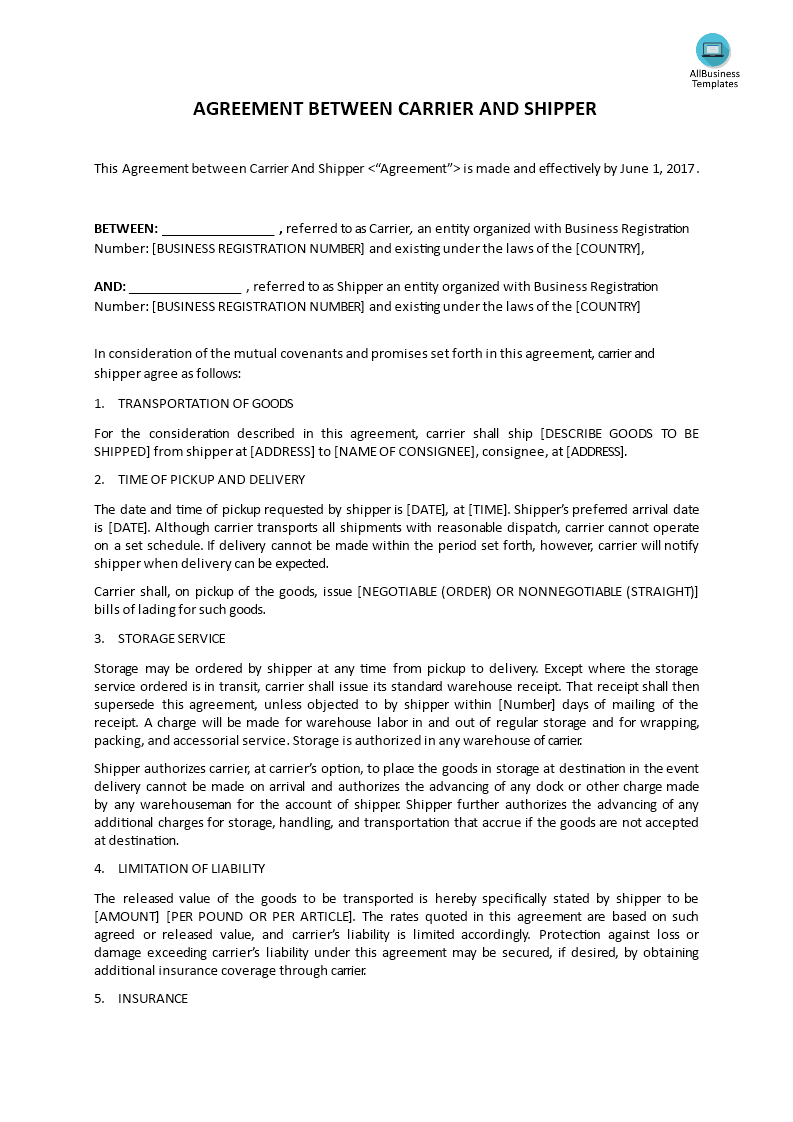Agreement between carrier and shipper
Save, fill-In The Blanks, Print, Done!

Download Agreement between carrier and shipper
Today: USD 2.15
Download It Now

Available premium file formats:
Microsoft Word (.docx)- This Document Has Been Certified by a Professional
- 100% customizable
- This is a digital download (30.3 kB)
- Language: English
- You will receive a link to download the file as soon as your payment goes through.
- We recommend downloading this file onto your computer.
Are you looking for Agreement between carrier (the vehicle) and shipper (the supplier)? Download this legal Agreement between carrier and shipper template now!
An agreement between a carrier and a shipper is a legal contract that outlines the terms and conditions under which the carrier will transport goods or cargo for the shipper. This type of agreement is common in the transportation and logistics industry, where carriers, such as trucking companies, airlines, shipping lines, or freight forwarders, provide transportation services to shippers who need to move goods from one location to another. The agreement serves as a legally binding document that governs the relationship and responsibilities of both parties.
Here are key elements typically found in an agreement between a carrier and a shipper:
- Identification of Parties: The agreement should clearly identify the carrier and the shipper by their legal names, contact information, and any relevant business details.
- Scope of Services: This section outlines the specific transportation services to be provided by the carrier. It includes details such as the type of cargo to be transported, the origin and destination points, and any special handling or equipment requirements.
- Rates and Charges: The agreement should specify the rates, charges, and payment terms for the transportation services. This includes information on the basis of pricing (e.g., per mile, per kilogram), any additional fees (e.g., fuel surcharges), and the terms of payment (e.g., due dates, payment methods).
- Liability and Insurance: Details regarding liability for loss, damage, or theft of cargo should be included. This section may also address insurance requirements, including who is responsible for obtaining and maintaining cargo insurance.
- Pickup and Delivery: The agreement should outline the procedures and responsibilities for cargo pickup and delivery, including timeframes, locations, and any requirements for packaging and labeling.
- Transportation Equipment: If specific equipment or vehicles are required for transportation (e.g., refrigerated trucks, flatbed trailers), this section should describe the equipment and any maintenance or inspection requirements.
- Shipping Documentation: The agreement may specify the type of shipping documentation required (e.g., bills of lading, packing lists) and the responsibilities of both parties regarding their preparation and handling.
- Cargo Inspection and Acceptance: Procedures for cargo inspection and acceptance at the point of origin and destination should be defined, including any reporting requirements for damaged or missing goods.
- Indemnification: This section may include clauses related to indemnification, where one party agrees to hold the other harmless in certain situations, such as legal claims or liabilities arising from the transportation services.
- Termination and Cancellation: Conditions under which the agreement can be terminated or canceled should be outlined, including any notice requirements and potential penalties.
- Dispute Resolution: Methods for resolving disputes, such as mediation or arbitration, should be specified in the agreement.
- Governing Law: The agreement should specify the governing law and legal jurisdiction that will apply in case of disputes or legal actions.
- Confidentiality: Any confidential information shared between the parties during the course of the agreement should be protected, and this section may include confidentiality clauses.
- Signatures: Both parties should sign the agreement to indicate their acceptance of the terms and conditions.
Agreements between carriers and shippers are crucial for ensuring smooth and reliable transportation services while providing legal protection for both parties. It's advisable for both carriers and shippers to consult with legal counsel or industry experts when drafting or entering into such agreements to ensure compliance with applicable laws and regulations and to protect their respective interests.
Our trustworthy legal templates are all crafted and screened by professionals. The 3 step process virtually guarantees you can finish and print your legal document in minutes! Feel free to download our basic or advanced template designs, they are intuitive and in several kinds of formats.
DISCLAIMER
Nothing on this site shall be considered legal advice and no attorney-client relationship is established.
Leave a Reply. If you have any questions or remarks, feel free to post them below.
Related templates
Latest templates
Latest topics
- GDPR Compliance Templates
What do you need to become GDPR compliant? Are you looking for useful GDPR document templates to make you compliant? All these compliance documents will be available to download instantly... - Daily Report Sheets For Preschool
How do you create a kindergarten schedule or write a daily report for a preschool? Check out these preschool templates here. - Celcius To Farenheit Chart
How to Download our temperature Celsius to Fahrenheit conversion charts and streamline your temperature calculations and conversions here. - Play Money Template
Where to download cool Play Money templates? Download below our printable and customizable Play Money templates for fun or with space for your face template now! - Flyer Template
Creating strong marketing materials that support your marketing strategy, such as flyers or online promotion (banners, ads) are an important part of growing a successful business!
cheese
